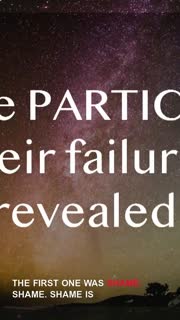The Fall: Deceit, Consequences, and God's Redemption Plan
Summary
### Summary
Good morning, everyone. It's wonderful to see you all, especially our visitors from Tennessee and our dear friends Gary and Kathy Niemeyer, who have served our congregation faithfully and are moving to Idaho. Today, we continue our series on the book of Genesis, focusing on the fall of humanity in Genesis 3. This chapter is pivotal as it marks the transition from the perfect world God created to a world marred by sin and deceit.
The fall begins with deceit, as the serpent, more crafty than any other animal, questions God's command to Eve. This deceit leads to a dangerous dialogue where Eve adds to and changes God's words, making her vulnerable to the serpent's lies. The serpent tempts her with the possibility of becoming like God, which leads to her and Adam eating the forbidden fruit. This act of disobedience results in immediate consequences: their eyes are opened, they realize their nakedness, and they hide from God.
God's response to their disobedience is both just and merciful. He questions them, and they shift the blame—Adam blames Eve, and Eve blames the serpent. Despite their failure, God provides a plan for redemption, cursing the serpent and promising that the offspring of the woman will crush the serpent's head. This is a foreshadowing of Jesus Christ's victory over sin and death.
The fall also brings dramatic consequences: pain in childbirth, a cursed ground, and ultimately, death. Yet, even in this, God shows His mercy by providing garments of skin to cover Adam and Eve and by preventing them from eating from the tree of life, which would have condemned them to live forever in their fallen state.
As we reflect on this passage, we are reminded of the importance of knowing God's Word, resisting deceit, and owning our sins. We are also reminded of God's incredible plan of redemption through Jesus Christ, who offers us forgiveness and eternal life.
### Key Takeaways
1. The Deceit of the Serpent: The serpent's deceit begins with questioning God's Word, leading Eve to add to and change God's command. This highlights the importance of knowing and adhering to God's Word without distortion. Deceit often comes subtly, making it crucial to stay grounded in the truth. [44:55]
2. The Dangerous Dialogue: Engaging in dialogue with deceit can lead to dangerous outcomes. Eve's conversation with the serpent shows how easily we can be led astray when we entertain doubts about God's Word. Our defense against such deceit is to know and declare, "It is written," just as Jesus did when tempted by Satan. [49:00]
3. The Climax of Failure: The fall of Adam and Eve brought immediate and severe consequences, including shame, fear, and separation from God. This teaches us that sin has real and painful repercussions, but it also points us to the need for repentance and God's grace. [55:16]
4. God's Plan of Redemption: Despite the fall, God immediately sets in motion His plan for redemption. The promise that the offspring of the woman will crush the serpent's head is a foreshadowing of Jesus Christ's victory over sin and death. This assures us that God's plan for our salvation was established from the beginning. [52:08]
5. Owning Our Sin: When confronted by God, Adam and Eve shifted the blame instead of owning their sin. We are called to own our sins, confess them, and seek God's forgiveness. 1 John 1:9 assures us that if we confess our sins, God is faithful and just to forgive us and purify us from all unrighteousness. [01:06:51]
### YouTube Chapters
[0:00] - Welcome
[35:42] - Honoring Gary and Kathy Niemeyer
[36:39] - Call to Prayer and Worship
[38:04] - Encouragement in Giving
[38:57] - Prayer for the Congregation
[40:41] - Introduction to Genesis Series
[44:10] - The Fall Begins with Deceit
[44:55] - The Serpent's Deceit
[49:00] - Dangerous Dialogue
[52:08] - God's Plan of Redemption
[55:16] - Climax of Failure
[01:06:51] - Owning Our Sin
[01:16:09] - Final Thoughts and Communion Preparation
[01:25:58] - Communion
[01:27:56] - Closing Worship and Prayer
Study Guide
### Bible Study Discussion Guide
#### Bible Reading
1. Genesis 3:1-24
2. 1 John 1:9
3. Romans 5:12
#### Observation Questions
1. What was the serpent's initial question to Eve, and how did it distort God's command? ([44:55])
2. How did Eve's response to the serpent's question differ from God's original command? ([49:00])
3. What immediate consequences did Adam and Eve face after eating the forbidden fruit? ([55:16])
4. How did Adam and Eve react when God confronted them about their disobedience? ([01:05:40])
#### Interpretation Questions
1. Why is it significant that the serpent began his deceit by questioning God's Word? How does this tactic relate to our own experiences with temptation? ([44:55])
2. In what ways did Eve's addition and alteration of God's command make her more vulnerable to the serpent's deceit? ([49:00])
3. How does the promise that the offspring of the woman will crush the serpent's head foreshadow Jesus Christ's victory over sin and death? ([52:08])
4. What does the act of Adam and Eve shifting blame teach us about human nature and our response to sin? ([01:05:40])
#### Application Questions
1. Reflect on a time when you were tempted to question God's Word. How did you respond, and what can you learn from Eve's experience to better handle such situations in the future? ([44:55])
2. Eve engaged in a dangerous dialogue with the serpent. Are there any "dangerous dialogues" in your life that you need to avoid? How can you better ground yourself in God's Word to resist deceit? ([49:00])
3. Adam and Eve faced immediate consequences for their disobedience. What are some real-life consequences you have faced due to sin, and how did you seek God's grace and forgiveness afterward? ([55:16])
4. When confronted with their sin, Adam and Eve shifted the blame. How do you typically respond when confronted with your own mistakes? What steps can you take to own your sins and seek forgiveness? ([01:05:40])
5. The sermon emphasized the importance of knowing God's Word to resist deceit. What specific steps can you take this week to deepen your understanding and knowledge of the Bible? ([53:41])
6. God's plan of redemption was set in motion immediately after the fall. How does this assurance of God's plan for salvation through Jesus Christ impact your daily life and faith? ([52:08])
7. The sermon highlighted the need for repentance and God's grace. Is there a specific sin you need to confess and seek forgiveness for today? How can you make this a regular practice in your spiritual life? ([01:06:51])
Devotional
Day 1: The Subtlety of Deceit
The serpent's deceit begins with questioning God's Word, leading Eve to add to and change God's command. This highlights the importance of knowing and adhering to God's Word without distortion. Deceit often comes subtly, making it crucial to stay grounded in the truth. The serpent's craftiness is a reminder that deception can come in seemingly harmless questions or suggestions that cause us to doubt God's clear instructions. By knowing God's Word intimately, we can recognize and resist these subtle attacks.
The serpent's approach to Eve was not overtly aggressive but rather cunning and manipulative. He began by questioning what God had said, planting seeds of doubt in Eve's mind. This tactic is still used today, as deceit often starts with small, seemingly innocent questions that lead us away from the truth. It is essential to be vigilant and discerning, always returning to the unchanging truth of God's Word to guide our thoughts and actions. [44:55]
Genesis 3:1-3 (ESV): "Now the serpent was more crafty than any other beast of the field that the Lord God had made. He said to the woman, 'Did God actually say, "You shall not eat of any tree in the garden"?' And the woman said to the serpent, 'We may eat of the fruit of the trees in the garden, but God said, "You shall not eat of the fruit of the tree that is in the midst of the garden, neither shall you touch it, lest you die."'"
Reflection: Think of a time when you were tempted to question God's Word. How can you better equip yourself with Scripture to recognize and resist subtle deceit in the future?
Day 2: The Peril of Engaging with Deceit
Engaging in dialogue with deceit can lead to dangerous outcomes. Eve's conversation with the serpent shows how easily we can be led astray when we entertain doubts about God's Word. Our defense against such deceit is to know and declare, "It is written," just as Jesus did when tempted by Satan. When we entertain deceitful thoughts or engage in conversations that question God's truth, we open ourselves up to being misled and making poor decisions.
Eve's dialogue with the serpent is a cautionary tale about the dangers of engaging with deceit. Instead of standing firm on God's command, she allowed the serpent's questions to create doubt and confusion. This led her to make a decision that had devastating consequences. We must learn from Eve's mistake and avoid entertaining deceitful thoughts or conversations. Instead, we should respond with the truth of God's Word, just as Jesus did when He was tempted in the wilderness. [49:00]
Matthew 4:4 (ESV): "But he answered, 'It is written, "Man shall not live by bread alone, but by every word that comes from the mouth of God."'"
Reflection: Reflect on a recent situation where you entertained doubts about God's Word. How can you practice responding with Scripture the next time you face similar doubts?
Day 3: The Consequences of Sin
The fall of Adam and Eve brought immediate and severe consequences, including shame, fear, and separation from God. This teaches us that sin has real and painful repercussions, but it also points us to the need for repentance and God's grace. The immediate consequences of their disobedience were a stark reminder of the seriousness of sin and its impact on our relationship with God and others.
Adam and Eve's disobedience led to a cascade of negative consequences. They experienced shame and fear for the first time, realizing their nakedness and hiding from God. This separation from God was a direct result of their sin, illustrating the profound impact that disobedience has on our lives. However, even in the midst of these consequences, there is hope. God's grace is available to us when we repent and seek His forgiveness. [55:16]
Genesis 3:7-8 (ESV): "Then the eyes of both were opened, and they knew that they were naked. And they sewed fig leaves together and made themselves loincloths. And they heard the sound of the Lord God walking in the garden in the cool of the day, and the man and his wife hid themselves from the presence of the Lord God among the trees of the garden."
Reflection: Consider a time when you experienced the consequences of sin. How did it affect your relationship with God and others? What steps can you take to seek repentance and restoration today?
Day 4: God's Redemptive Plan
Despite the fall, God immediately sets in motion His plan for redemption. The promise that the offspring of the woman will crush the serpent's head is a foreshadowing of Jesus Christ's victory over sin and death. This assures us that God's plan for our salvation was established from the beginning. Even in the midst of judgment, God provides hope and a future through His redemptive plan.
God's response to the fall includes both judgment and mercy. While He pronounces curses on the serpent, the woman, and the man, He also provides a glimmer of hope through the promise of redemption. The prophecy that the offspring of the woman will crush the serpent's head points to Jesus Christ, who would ultimately defeat sin and death through His sacrifice on the cross. This promise reminds us that God's plan for our salvation was in place from the very beginning, offering us hope and assurance in His redemptive work. [52:08]
Genesis 3:15 (ESV): "I will put enmity between you and the woman, and between your offspring and her offspring; he shall bruise your head, and you shall bruise his heel."
Reflection: How does knowing that God's plan for redemption was established from the beginning impact your faith? In what ways can you live out this hope in your daily life?
Day 5: The Importance of Owning Our Sin
When confronted by God, Adam and Eve shifted the blame instead of owning their sin. We are called to own our sins, confess them, and seek God's forgiveness. 1 John 1:9 assures us that if we confess our sins, God is faithful and just to forgive us and purify us from all unrighteousness. Owning our sin is the first step towards repentance and restoration in our relationship with God.
Adam and Eve's initial response to their sin was to shift the blame onto others. Adam blamed Eve, and Eve blamed the serpent. This tendency to avoid taking responsibility for our actions is a common human trait, but it hinders our ability to receive God's forgiveness and healing. Instead, we are called to own our sins, confess them, and seek God's forgiveness. When we do so, we experience the cleansing and purifying power of God's grace, restoring our relationship with Him. [01:06:51]
1 John 1:9 (ESV): "If we confess our sins, he is faithful and just to forgive us our sins and to cleanse us from all unrighteousness."
Reflection: Think of a sin you have been avoiding taking responsibility for. How can you confess it to God today and seek His forgiveness? What steps can you take to make amends and restore any broken relationships?
Quotes
### Quotes for Outreach
1. "We can't expect for an awakening in America without a beginning here in the heart, of God. Of God's people. And that's what God said to Solomon. I mean, he said, this is what it is. If my people, if my people. That's where it starts." [37:10] (15 seconds)
2. "When we give, we give out of a heart of gratitude of what God has done in our lives. And we give to the Lord. We don't give to a local church. We give through a local church to the Lord. And what we do, what we're able to do, both here in this community, in this place, but also around the world, is because of your faithful giving." [38:04] (19 seconds)
3. "God's word is eternal and it is unchanging. We are not to change or distort the truth of God's word to meet our own needs or desires. It is not for us to do that. God's word is eternal and is unchanging. And it must remain so, for the power of God's word to affect the differences and the changes in our life that all of us so desperately need and desire." [50:36] (30 seconds)
4. "If you sin, own it. Own it. That's me. I'm not going to. I'm not going to blame. It's not. No, no, I'm not going to blame. I'm going to own it. I'm going to own it." [01:18:01] (18 seconds)
5. "Don't be afraid. I'm with you. Don't be discouraged. I'm your God. I'll strengthen you and help you. I will hold you up with my victorious right hand. You see, that's God's word. Take his word. Take his word. Apply his word to your life and not the adversary of your souls." [01:17:29] (16 seconds)
### Quotes for Members
1. "The fall that we see in the book of Genesis is a game changer. It changes everything. It changed this world from what God had created perfect, and which he called good, into something that became less than what God had intended. So we're going to talk about the fall. And it begins with deceit. It begins with deceit." [44:10] (28 seconds)
2. "Husbands, dads, we have a responsibility to protect our families. Gentlemen, step up to the plate. Intervene. Get in the middle of it all and say, no, this is not happening on my watch. It's not going to happen. Dads, men in this room, it is your responsibility. It is our responsibility. We have been designed and ordered by God to take that leadership responsibility. It's time we take it." [56:58] (34 seconds)
3. "The first one was shame. Shame. Shame is the painful feeling arising from the consciousness of something dishonorable and improper, ridiculous, done by oneself or another. The text is clear. They realized they were naked. Something changed, and their response was to cover up. This was more than physical nakedness. This was a nakedness of their soul, and they knew it." [01:00:22] (29 seconds)
4. "You are not so far away from God. You are not in such a hopeless, shame-filled, fearful situation that God, right at this very moment, by his Holy Spirit, is saying, where are you? I'll say it another way. I am here for you. He did not forsake his creation, and he will not forsake us. I'm telling you, that's good news." [01:02:26] (37 seconds)
5. "The Son of God came to destroy the works of the devil. Yes, there was a confrontation and it was decisive. And that decisiveness was in the favor of our God. Never forget that." [01:09:45] (11 seconds)










